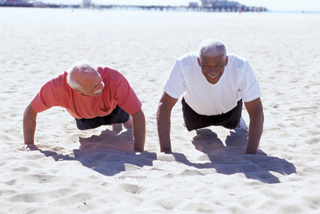I love the ocean and the beach. Especially in the early morning. You beat the crowds, it’s cooler and there’s a gentle calmness in the air. I asked an expert if a proud, out-of-shape, AARP-card holder could give me advice on getting in shape while walking on the beach.
Her response: There’s a simple way to burn more calories per step without inching up your incline or pushing your pace: Walk or run on the sand. (I’ll walk for now, thank you). Studies show that you’ll activate extra muscle just by treading on sand rather than solid ground.
Also, the soft surface absorbs more energy, so instead of experiencing a helpful rebound effect as you would on pavement, you sink deeper and your muscles have to engage longer to push off. The payoff: Do a workout on the sand and you burn up to 50 percent more calories per minute than if you do the same routine on pavement or grass. Gotta love it.
Plus, because sand soaks up some of the pounding, it also reduces stress on your joints. Good for us old farts. Research found that the impact is about four times lower on sand than on firmer surfaces, which can mean much less post workout inflammation and soreness. This remains true even as you increase your exercise intensity. The bonus is that you’ll bounce back faster after a tough session.
What kind of sand is best to exercise in? Tighter, more packed sand (or even better, wet sand) is preferable to a dry, looser surface. It’ll still be soft, but you’ll sink in less and be less likely to overuse your muscles while trying to stable. Down by the shore is the perfect wet sand scenario for me.
She also told me that even though your muscles are working extra hard, you might not feel the impact of an hour-long beach work out until the next day. She suggested starting with just 20-30 minutes at a time (or even less) to make sure you don’t overdo it. And if you live near the ocean, don’t start doing all your workouts at the beach. Once a week would be ideal to begin with. Ok with me.
Running in wet socks or with sand shoes is nobody’s idea of fun. Yuk. Experts say it’s fine to run barefoot. But, if you’re prone to injury or require a very supportive shoe, you might want to keep them on. Not sure? Try walking a mile on the beach. If your calves hurt the next day, you probably shouldn’t run barefoot.
Wear extra sunscreen, since water and sand reflect rays. And check the tides so you don’t get stuck in a situation where you’re far from home and can’t run back.
See you at the beach, my fellow exercisers! Here’s an easy way to start an exercise routine on the sand. I’m going to try it this weekend.
30-Minute Sand Workout
4 minutes
Warm up with a brisk walk It will take you at least this much time to get to the shoreline.
6 minutes
Do each move below for 30 seconds:
Walk at a fast pace.
Side shuffle with right foot leading.
Side shuffle with left foot leading.
Walk backward.
Repeat twice.
10 minutes
Run or walk at a moderate pace.
10 minutes
Stretch your body for 5 minutes.
Lay or sit on the sand, eyes closed and relax or meditate for the last 5 minutes.


























